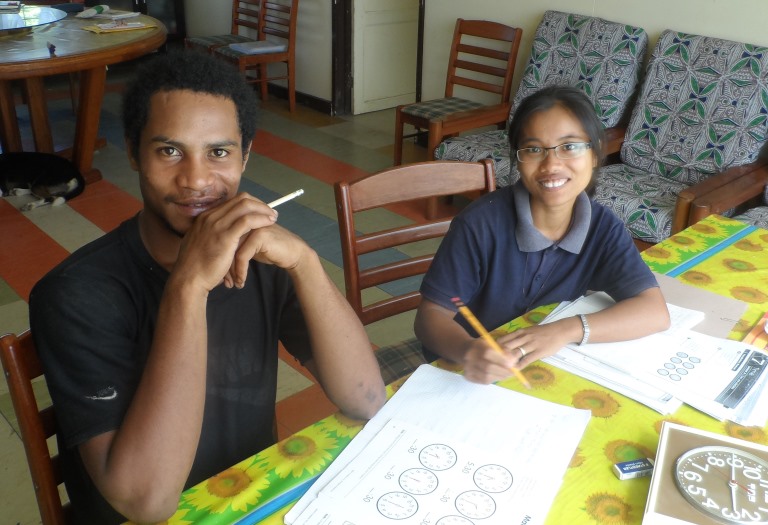|
In Papua New Guinea, education is a brand new concept
Tuesday, July 7, 2015
"They don't live in houses; they live around camp fires, fairly widely dispersed. There are no schools. Nor do they have any toilets."
By Maria Lozano
NEW YORK—“Please, come to help!” This cry for help prompted
Sister Caterina Gasparatto to leave behind the comforts of life Italy and go
back to something like the Stone Age, which is one way to describe life in the
Diocese of Bereina in the central province of Papua New Guinea.
Sister Gasparatto joined three fellow women religious from her community
of the Jesus the Good Shepered, an Italian, a Filipino and a Vietnamese.
"I'd never heard about Papua New Guinea before; we were moved by the Holy
Spirit,” she told internatinal Catholic charity Aid to the Church in Need.
The diocese is the poorest in the country; it’s home to some 84,000
Catholics. "They don't live in houses; they live around camp fires, fairly
widely dispersed. There are no schools. Nor do they have any toilets,” the
Sister reported.

One of the local Church’s greatest challenges is the battle against the
human, social and economic ruin caused by the practice of chewing the betel
nut. This hallucinogenic drug, its consumption associated with ancient customs,
is paralyzing the development of society. "It is such a powerful stimulant
that people can go for three days without eating. Both men and women don't
bother about their work, or about their children, or about anything… They only
have one preoccupation—how to get hold of the betel nut,” Sister Caterina
explains.
The women religious wield the education of children and young people as a
powerful tool to combat the ravages addiction; for one thing, the sisters act
like parents for their charges, both boys and girls, the latter traditionally
confined to the home and even sold to the families of future husbands.
The sisters are working hard to break various abusive cycles."There
is a great deal of hope. We have just opened a school and we already have 170
children, aged between six and twelve” and even older. This is the first time
any of them have set foot in a school,” said Sister Gasparatto; “ou can't
imagine how hard it is to start holding a pencil at the age of 20.” Fundamental
to the job is to get the youth to stop eating the betel nuts.
Papua New Guinea is home to between 800 and 1,000 different ethnic groups,
who speak a total of 836 indigenous languages. Many of the problems between the
members of the different ethnic groups and clans end up in violence. The
sisters are also putting much energy into promoting the concept of forgiveness
and reconciliation.
Their job is very, very difficult, but the rewards are enormous. Making
progress, changing lives, bit by bit, said Sister Gasparatto, “is like a dream
come true.”
Learning to write (ACN photo)
|